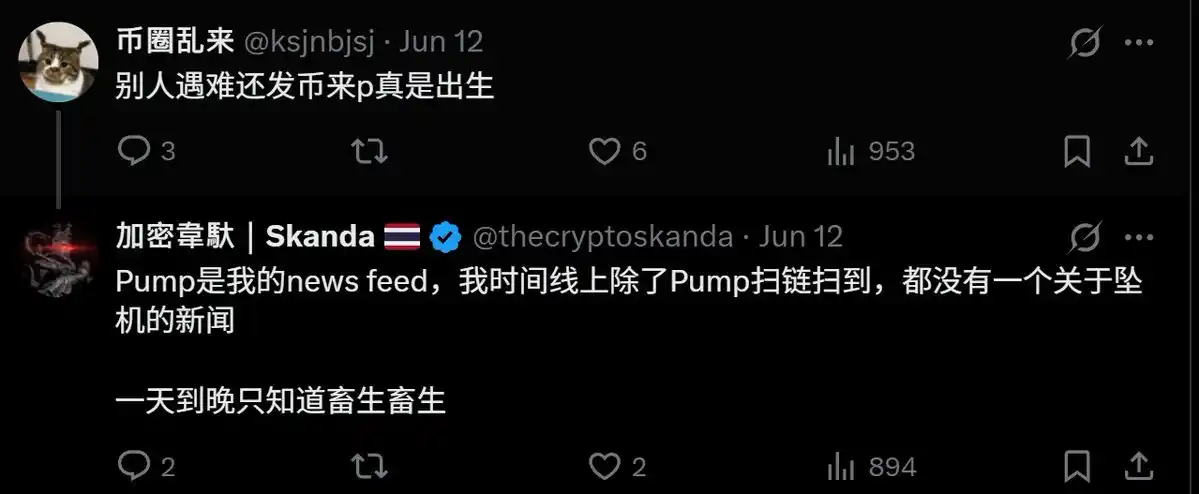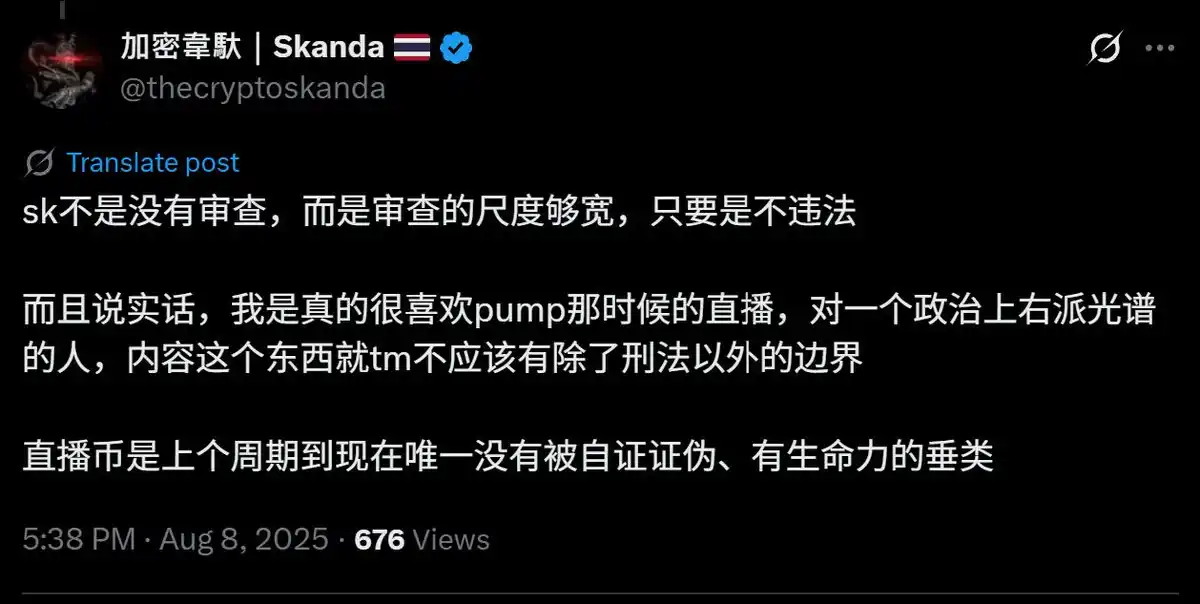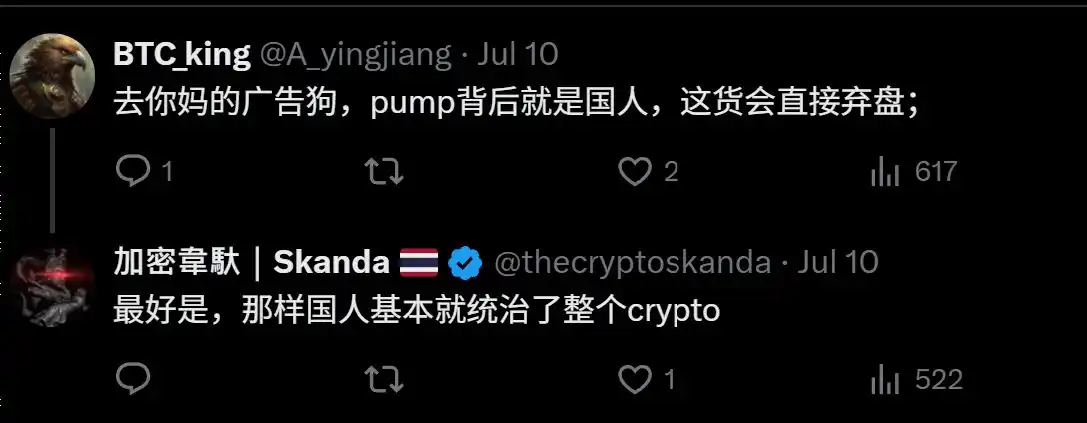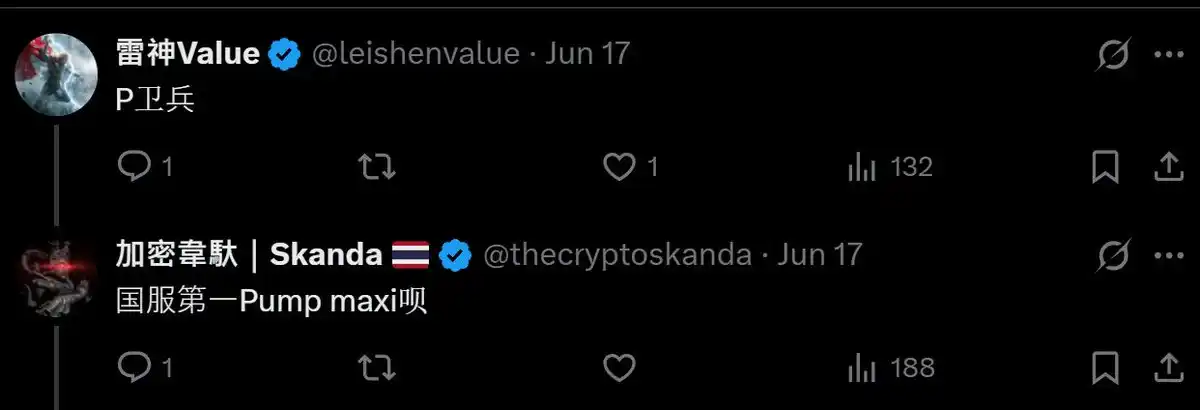error
The most accurate thing about Pump is that he understood before anyone else that this generation of young people is the 'PVP Generation'.
Original Title: "Going Long on Pump, Going Short on Human Nature - An Analysis of Pump Fun in an $8 Billion Market Cap"
Original Author: Crypto Wei Tuo, Crypto KOL
In July, facing the entire network's FUD as the first pundit of Pump in Simplified Chinese, I was cursed for two months and blocked by thousands of people.

Rolling warehouse accumulation at the bottom, repeatedly opening long positions in between, getting liquidated, then adding more positions, getting liquidated again, all while bearing a large loss with a "spot position doesn't matter" mindset. $Pump is the coin that has caused me the most pain in my two years of holding a large position. Now, phrases like "I have always said" in various situations and metaphors such as "the light boat has passed through ten thousand mountains" are used, but I won't bother repeating them here.
In my opinion, the game theory problem of Pump proposed by the wizard, as well as the majority of the narratives and moats related to Pump in Simplified Chinese, fundamentally reflect a misunderstanding of the Pump audience.
TL;DR
- What Pump understands the most is that he realized earlier than anyone else that this generation of young people is the "PVP generation";
- Pump, based on the values of the PVP generation, has led to mass media, equivalent to Truth Social and Bluesky;
- The game theory of live coins is no different from other coins; it should be understood from a track and ecosystem perspective;
- The reason Pump must do live coins is to seize Taker liquidity from trading platforms;
- The fundamental reason I am a Pump maxi is that I deeply understand the darkness of human nature and the inevitable chaos of the world's direction;
Understanding the PVP Generation
For any project, the most decisive factor is the audience.
Pump's biggest moat is his audience, that is, the "PVP generation" I mentioned in The Open Source Sickle 23, the generation born after 2005.
Why?
What we previously referred to as moats: liquidity, technology, compliance thresholds, etc., discussing these presupposes the economic rationality assumption—individuals in economic activities are self-interested, able to rationally weigh pros and cons, and seek to maximize their economic interests at minimal cost; BTC mining games, DeFi, tokenomic models, and others are all based on this premise.
Of course, in practice, not everyone can be a saint. And the rational inheritance is institutional; as long as the wielders of influence and discourse among economic participants are "rational," then these models basically still hold.
The problem lies here: the PVP generation is the first generation to grow up under the influence of social media discourse.
The characteristics of this generation are:
- During their childhood, unlike our generation, they did not experience the struggles of basic needs, and had no worries about food and clothing
- The influence of "non-rational amplifiers" such as social media on them far outweighs rational education
- In the vast majority of countries, this generation has never experienced the kind of global economic growth that their parents did. Instead, due to technological displacement and industry shifts, they have faced a sharp decline in job opportunities
As a result, their way of thinking is "non-rational," based on labels rather than rational analysis.
Moreover, the smartest among them are significantly more engaged in zero-sum industries, including finance, real estate, entertainment, and other service industries. The essence of these industries is to take money out of other people's pockets and put it into their own, essentially splitting the pie rather than making it.
If you don't believe it, you can look back over the past 10 years: Are China's most profitable companies all transitioning to finance? Are a large number of highly educated individuals engaging in live streaming and becoming internet celebrities? Are America's youth mostly left-leaning, not considering the "make America great again" like the right but rather focusing on being a "social justice warrior," dividing the pie?
Zero-sum, in the eyes of the previous generation, was seen as "rugging." However, to this generation, it is the new norm. Therefore, using past universal moral and value-based logic to judge them is meaningless.
They are indifferent to survival issues. Their understanding of achievement is "how many followers do I have" or "how do I go viral," rather than like their parents' generation, focusing on how to build a "business." They even disdain their parents' values.
Behaviorally, this generation is lacking in professionalism but strong in action. They know well how to purposefully "seek attention," detest judgment even in the slightest form, and have an extremely low tolerance for the time it takes to receive feedback, unable to tolerate delayed gratification.
The Core Moat of Pumping
The success of Pump mainly lies in understanding the demands of the PVP generation:
- No Moral Judgment
- Hyper Timely Feedback Incentives
- Low Barrier to Entry
The latter two are solved through product features, and according to many, "there is no moat."
So the core of Pump's awesomeness, has shaped a value system that does not adhere to traditional moral judgment. As long as you win, attract attention, you are awesome. Pump will never hypocritically say things like "community first," "long-term value," "team has vision," and so on, like other projects.
Even if you rug pull like $Quant Kid Brother or say $HANDS No Hands Brother, the official and community accounts will only treat you as a new meme to be included in videos. In Pump, there is no concept of seeking restitution.
There are various meme coins, political coins (even so-called "dead coins"), which may be censored on other platforms or even on Twitter itself, making it impossible to cash out. But in Pump Fun, everything is possible.

Whether it's a PvP-generation dev or a trench warfare enthusiast, they hate being rugged or rug pulled, but they hate being preached to even more, being told that what they are involved in is a "scam, rug pull, or rug pull." For the incels of the PvP generation, battlefield matters in battle, but being denied in values is a visceral disgust.
Whether you like it or not, values are the foundation of mainstream media.
Just like how the right-wing oldies hated being silenced on Twitter in the Jack Dorsey era, giving rise to Truth Social; the left-wing oldies hated Musk and believed X to be Farcist Rhetorics, so they went to Bluesky. People choose their own echo chambers based on their values. The PvP generation thinks you're all a bunch of oldies, so they chose PumpFun.
If you ask me why I understand this so well, it's probably because "I understand birth from birth," I guess.
Pump Live Coin Game
Last year, in a conversation with a friend, I was clearly bullish on live coins and believed that live coins were the only race last year that was not debunked (Pump was interrupted because of rectification rather than an inability to continue broadcasting). This also became the main reason why I supported @Sidekick_Labs at the time.

Of course, the question the wizard asked earlier is also very representative: web2 is tipping, so the streamer has the motivation to keep streaming in order to earn money. In web3, it's watering, where the streamer already holds the tokens, streams for a while, experiences a price drop, and then what's the incentive to continue streaming? Just to collect transaction fees? If a large number of viewers rug pull, isn't the game constantly reset? Does the market cap keep decreasing?
First, what he said about game theory deduction is correct, but this is based on a specific coin. If we look at it from a broader perspective, we need to think inversely: if it's not streaming, would it be the same?
Whether it's the previous AI, Bonk's CTO, Solana's ICM, or even beyond on-chain launches, including exchange VC coins, the advantage has always been with the dev team. They can directly sell off and leave.
What can influence whether a team abandons the project is only the upfront cost and whether there is a continuous cash flow. If the upfront cost is high and there is ongoing cash flow, the project team will not rug pull.

Looking back now, is this what happened? Similarly, if a streamer rugs once, they basically cannot stream again, it's a one-time deal. If they can keep earning creator fees like Bagwork, why would they want to kill a cash cow?
Secondly, in web2, the streaming industry is an industrialized system, and the streamer is just a figurehead (corresponding to the memecoin perspective). The real driving force is buying viewership, finding backers, finding shell companies for money laundering, and arms dealers. The streamer doesn't get much money.
The same goes for streaming coins; a coin's success largely depends on market makers. Streamers are unlikely to be market makers, so Pump is responsible for attracting wannabes, and the market makers take on the role of shell companies.
Here are two points:
- The most profitable aspect of a casino is not gambling itself, but the turnover. The ratio is around 1:9;
- For coins like ICM or AI, as a market maker, you need to control a team; for streaming coins, you only need to control a person.
Why did Pump have to create a streaming coin?
This was Pump's most intelligent decision.
The key to the entire Solana chain's traffic lies not in the node, but in the transaction platform, in Axiom.
Solana can systematically discredit Pump, incite VC funding to support Bonk or other nodes, rush to Useless, but money flow and attention are two different things; users' transactions, whether in Bonk or Pump coins, all go through Axiom, no matter what story you tell, it's all damn CA.
But live streaming is different; the content of live streaming directly translates into the candlestick chart (K-line); placing orders while watching a live stream will have an asymmetric information advantage over watching Axiom's K-line. And live streaming is not a specific narrative; it is a traffic carrier itself. The order volume will truly tilt towards Pump.
Therefore, the key data for the next stage is to see if Pump's frontend order volume can seize Axiom's market share, rather than looking at the ratio between Pump and other nodes.
Why Did I Support Pump So Early

For quite some time, I was almost the sole Pump Maxi in Simplified Chinese, and I had to give a reason:
1. I have led a Dev team myself;
2. I have built a launchpad myself but failed to succeed, understanding why my own launchpad and others on Solana would fail, witnessing the brilliance of Pump;
3. I knew Pump's early investors very early on, gaining firsthand insights, witnessing the working methods and logic of the Pump team up close;
4. I spent a lot of time with young people;
5. I have been in the game for 10 years; maybe I'm not precise about the second level, but I understand human nature, especially the dark side of human nature. My fundamental understanding of the world tends towards chaos, and chaos is a ladder;
6. As I said, the Pump team is a shark, a conqueror reading about Napoleon on the toilet.
Disclaimer: The content of this article solely reflects the author's opinion and does not represent the platform in any capacity. This article is not intended to serve as a reference for making investment decisions.
You may also like
Coinpedia Digest: This Week’s Crypto News Highlights | 29th November, 2025
QNT Price Breaks Falling Wedge: Can the Bullish Structure Push Toward $150?

Digital dollar hoards gold, Tether's vault is astonishing!

The Crypto Bloodbath Stalls: Is a Bottom In?

